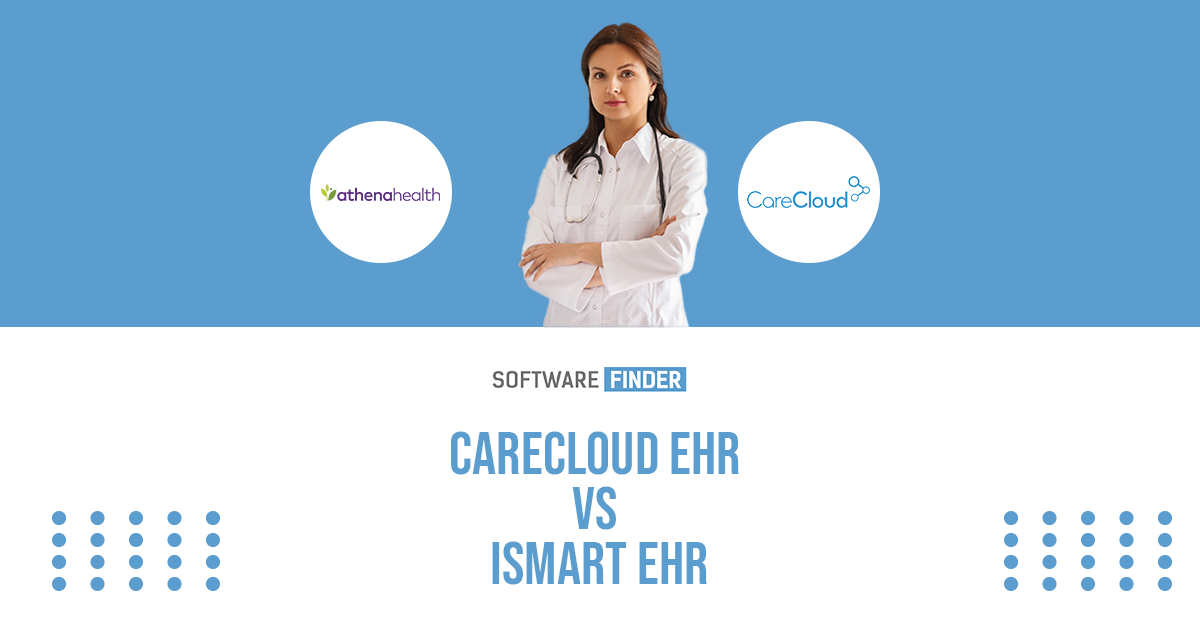
Introduction:
Electronic Medical Record (EMR) and Electronic Health Record (EHR) software have become essential tools for healthcare providers to efficiently manage patient data, streamline workflows, and enhance patient care. In this report, we will compare two popular software solutions: CareCloud EMR and iSmart EHR.
Overview:
CareCloud EMR:
CareCloud EMR is a comprehensive cloud-based electronic medical record system designed to improve clinical documentation, practice efficiency, and patient outcomes. It offers features such as patient scheduling, charting, e-prescribing, billing, and reporting.
iSmart EHR:
iSmart EHR is an electronic health record system that focuses on providing innovative solutions for healthcare organizations. It includes features like patient management, charting, e-prescribing, appointment scheduling, billing, and analytics.
User Interface and Ease of Use:
- CareCloud EMR: CareCloud EMR offers a modern and intuitive user interface, making it easy for healthcare professionals to navigate and access patient information efficiently. The system provides customizable templates for charting, which can be tailored to fit specific specialties and workflows.
- iSmart EHR: iSmart EHR also boasts a user-friendly interface with intuitive navigation. It offers customizable templates and forms, allowing healthcare providers to personalize their workflows. The system provides a streamlined user experience to enhance productivity.
Features and Functionality:
- CareCloud EMR: CareCloud EMR offers a range of features such as electronic charting, e-prescribing, lab integration, patient portal, appointment scheduling, revenue cycle management, and reporting. It focuses on interoperability and seamless data exchange to facilitate collaborative care.
- iSmart EHR: iSmart EHR provides features including patient management, e-prescribing, appointment scheduling, billing, secure messaging, and analytics. It emphasizes advanced analytics and reporting tools to help healthcare organizations gain insights and improve decision-making.
Integration and Interoperability:
- CareCloud EMR: CareCloud EMR is designed to integrate with other systems, allowing seamless data exchange with labs, pharmacies, and other healthcare providers. It supports HL7 standards for interoperability and offers integration with third-party applications.
- iSmart EHR: iSmart EHR also supports integration with external systems and devices. It facilitates interoperability through standard protocols and APIs, enabling data exchange with labs, imaging centers, and other healthcare providers.
Security and Compliance:
- CareCloud EMR: CareCloud EMR prioritizes data security and HIPAA compliance. It employs robust security measures, including encryption, access controls, and audit logs, to protect patient information from unauthorized access.
- iSmart EHR: iSmart EHR follows industry-standard security practices and compliance regulations. It incorporates encryption, user authentication, and role-based access controls to safeguard patient data.
Pricing and Scalability:
- CareCloud EMR: CareCloud EMR offers flexible pricing plans based on the specific needs of the healthcare organization. It provides scalability options to accommodate the growth of practices and can support both small clinics and larger healthcare facilities.
- iSmart EHR: iSmart EHR provides pricing information based on individual requirements. It is scalable and can cater to various healthcare settings, from small practices to multi-location organizations.
Customer Support and Training:
- CareCloud EMR: CareCloud EMR offers customer support through phone, email, and online chat. They provide training resources, including webinars, documentation, and video tutorials, to assist users in getting familiar with the system.
- iSmart EHR:
iSmart EHR provides customer support through multiple channels, including phone, email, and online chat. They also offer training and onboarding assistance to help healthcare providers effectively implement and utilize the software. The company may provide documentation, user guides, and tutorials to support users in their learning process.
Mobile Access:
- CareCloud EMR: CareCloud EMR offers mobile access through its companion mobile app, allowing healthcare providers to access patient information, review charts, and perform other essential tasks on-the-go. This mobile app is compatible with both iOS and Android devices.
- iSmart EHR: iSmart EHR also provides a mobile app that enables healthcare professionals to access patient data, view charts, and perform various tasks using their mobile devices. The app is designed to be compatible with iOS and Android platforms.
Limitations:
- CareCloud EMR: Some users have reported occasional system slowness or lag in certain functionalities. Customization options might be limited compared to other software solutions. The availability of certain features and integrations may vary depending on the specific plan and pricing.
- iSmart EHR: Users have occasionally reported issues with customer support response time. Some users may find the initial learning curve slightly steep, especially if they are not familiar with electronic health record systems.
List of Features
Here are some features commonly associated with CareCloud EMR and iSmart EHR based on general knowledge up until September 2021:
CareCloud EMR:
- Patient scheduling: Manage appointments, availability, and reminders.
- Charting: Create, update, and access patient charts and medical records.
- E-prescribing: Electronically send prescriptions to pharmacies.
- Lab integration: Receive and view lab results within the EMR system.
- Billing: Generate and manage patient invoices, claims, and billing information.
- Reporting: Generate reports on patient data, financials, and practice performance.
- Mobile access: Access patient records and manage practice functions remotely via mobile devices.
- Patient portal: Provide patients with access to their medical records, appointment scheduling, and secure communication.
iSmart EHR:
- Appointment scheduling: Manage and organize patient appointments.
- Clinical documentation: Capture patient encounter details, notes, and medical history.
- E-prescribing: Electronically send prescriptions to pharmacies.
- Lab integration: Integrate with laboratory systems to receive and manage test results.
- Billing: Generate and manage patient invoices, claims, and billing information.
- Customizable workflows: Tailor the EHR system to specific specialties and individual preferences.
- Reporting: Generate reports on patient data, financials, and practice performance.
- Patient portal: Provide patients with access to their medical records, appointment scheduling, and secure communication.
It’s important to note that features may vary between different versions or editions of the software, and there may have been updates or additions since my knowledge cutoff in September 2021. It’s advisable to visit the official websites or contact the vendors directly for the most up-to-date and detailed information about each software product.
Conclusion:
Both CareCloud EMR and iSmart EHR offer robust features and functionality to meet the needs of healthcare organizations. CareCloud EMR emphasizes interoperability, customization, and comprehensive clinical documentation, while iSmart EHR focuses on innovative solutions, advanced analytics, and personalized workflows. The choice between the two software solutions ultimately depends on the specific requirements and preferences of the healthcare organization. It is advisable to request demos, evaluate trial versions, and consider factors such as usability, scalability, integration capabilities, and customer support before making a decision.





